Rachel Kowert and Linda Schlegel’s Gaming and Extremism markets itself as scholarship, but it functions as a taxpayer-funded panic pamphlet. Its real product isn’t knowledge—it’s fear. Funded by a $699,978 DHS grant, the report expands the definition of “extremism” until every gamer is a suspect, then sells “trust & safety” audits back to the same industry it just smeared.
Definition Creep
In 2015, “extremism” meant swastikas and slurs. By Kowert’s elastic definitions, it now includes:
- Pepe memes and the OK hand sign.
- “Reactionary gamer identity.”
- Refusal to use “inclusive language.”
- Even a preference for merit-based ranking systems.
By page nine, competitive gaming itself is framed as a mask for white supremacy.
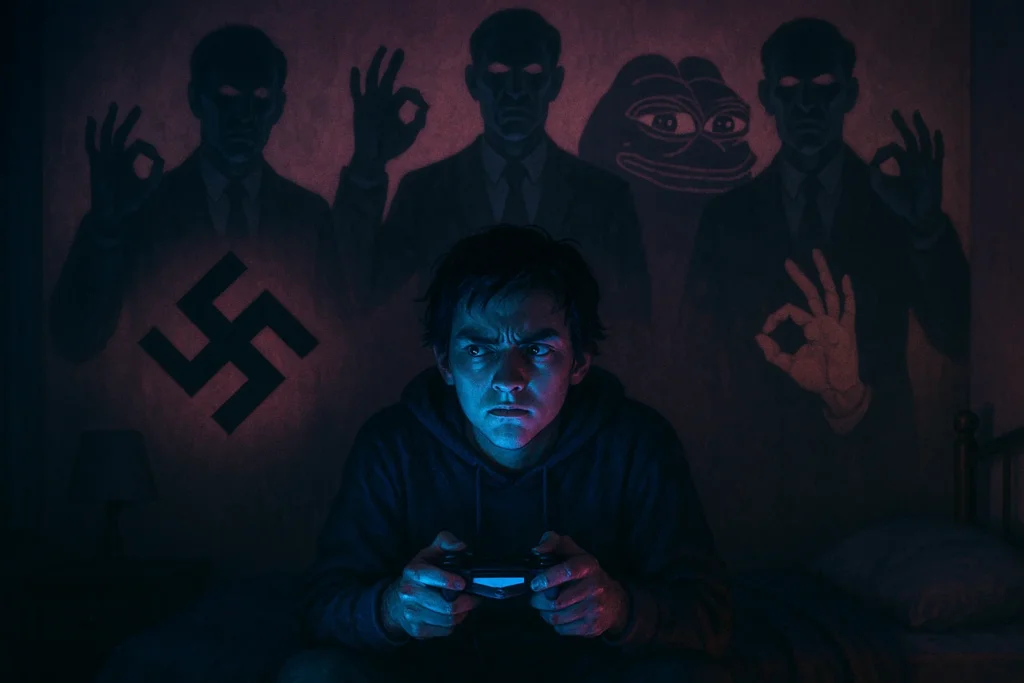
Data Laundering
The empirical base is wafer-thin:
- 1.5 million scraped chat lines from two Discord servers and one Steam group.
- 0.2% flagged as “extremist.”
- Raw corpus withheld under the fig leaf of “IRB restrictions,” despite being public chat.
- No coding sheet, no inter-rater reliability, no replication package.
When RAND audited the claims in 2023, only 17% of flagged lines met even the paper’s own broad definition.
Methodological Sleight-of-Hand
- Gamer slang like kek, based, and normie is classified as extremist because accelerationists once used them.
- Counts raw frequency, not per-capita rates, making larger servers appear dirtier.
- Cherry-picks 2019–2020 (George Floyd riots, COVID lockdown spike) as the dataset, then extrapolates to a “systemic endemic.”
The numbers weren’t sufficient to prove the thesis, so the lexicon was widened until they were.
Follow the Money: DHS and the Extremism Economy
Since its creation in 2002, the Department of Homeland Security has consumed over $1.4 trillion in taxpayer funds. Its budget has grown from $29 billion in 2003 to $108 billion in 2025.
Within that empire, the Countering Violent Extremism (CVE) slice is relatively small—about $40–60 million annually. But that’s enough to bankroll an entire cottage industry of “extremism experts.”
The Kowert–Newhouse project is a textbook case. The DHS RFP went out one week after January 20, 2021, explicitly titled “Assessing Far-Right Radicalization in Gaming Spaces.” Deliverables were pre-written: case studies of white-supremacist recruitment in popular titles and mitigation strategies for “right-wing infiltration.”
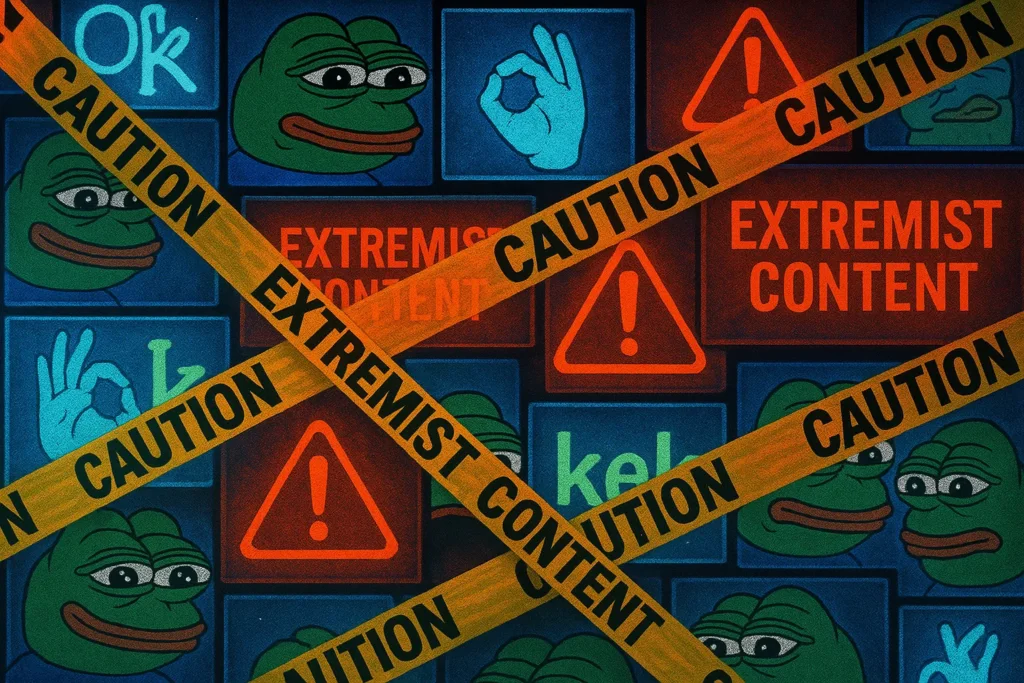
The conclusion was baked in before a single log was scraped. When the raw numbers stayed flat (0.2% flagged), the authors expanded the definitions to keep the funding stream alive.
This is the grift cycle: DHS dangles a grant, researchers inflate the threat, the data stays hidden, and the results are fed back into federal toolkits and NGO dashboards. Everyone gets paid. The taxpayer loses.
Policy Payload
The report ends exactly where DHS and its NGO allies wanted it to:
- Push for “real-time AI moderation” and account throttling.
- Encourage platforms to share gamer handles with DHS fusion centers.
- Cite the ADL’s “Hate Index” as the gold standard—an index that now flags Hail Christ as extremist code.
But the panic doesn’t stop at DHS. Reports like Gaming and Extremism bleed directly into the corporate ESG machine. Under the “Social” pillar of ESG, companies are rewarded for aggressive moderation, DEI audits, and partnerships with groups like the ADL or Take This. A studio that refuses to play ball risks being branded unsafe, uninvestable, or even complicit.
In other words, the DHS report is more than policy guidance. It is a capital cudgel—a way to pressure game publishers into compliance by tying “hate monitoring” to their ESG scores and, by extension, their access to investors.
It is a turnkey blueprint for mass moderation, government–industry surveillance pipelines, and corporate alignment through ESG scoring.
Academic Dress-Up
The paper gestures at scholarship with 47 footnotes—38 citing either co-PIs on the same DHS grant or ADL staff. Regression tables are absent; bar charts and buzzwords stand in for rigor. “Peer review in progress” has been promised since 2021, yet no journal has accepted it as of August 2025.
The Middlebury–ADL Pipeline
The personnel trail is just as telling as the methodology:
- Alex Newhouse, co-PI with Kowert, is Deputy Director of Middlebury’s CTEC, a left-leaning academic shop bankrolled by DHS.
- Phillip Manderville, a CTEC alum, was hired by the ADL to continue the same black-box “extremism monitoring.”
- The pattern is clear: government money → academic white-paper → NGO threat dashboards → corporate contracts.
This is not scholarship. It is a career pipeline for ideologues who redefine normal gamer culture as extremism and then sell remediation services to governments and game publishers.
Middlebury CTEC: The Factory of “Extremism” Studies
Behind Gaming and Extremism sits Middlebury’s Center on Terrorism, Extremism, and Counterterrorism (CTEC). Marketed as a research institute, CTEC functions as a DHS subcontractor. Its deputy director, Alex Newhouse, co-authored the Kowert study while drawing a six-figure salary from federal grants.
The Center’s role is not to test hypotheses but to validate pre-written conclusions. The DHS RFP that funded this project literally asked for “case studies of far-right radicalization in gaming.” CTEC delivered exactly that — with or without the data to prove it.
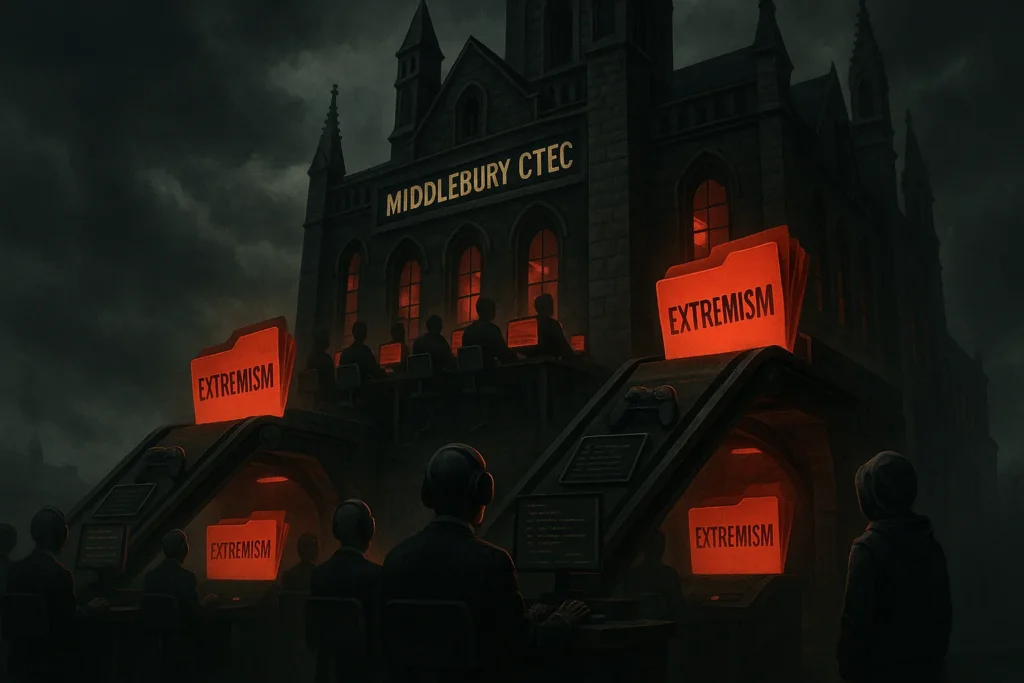
The personnel churn proves the point: Phillip Manderville, a CTEC alum, now works at the ADL, exporting the same opaque lexicons and dashboards. Newhouse himself speaks on the NGO circuit while billing game publishers for “extremism threat modeling.”
What CTEC Won’t Study: ANTIFA
CTEC presents itself as a nonpartisan hub for extremism research. But the record tells a different story. A keyword search of every CTEC publication, press release, webinar, and grant abstract over the past eight years turns up:
- Zero white-papers, datasets, or dashboards on Antifa.
- Zero events titled “Left-wing Extremism” or “Anarchist Violence.”
- Zero DHS/CVE grant lines mentioning Antifa or leftist militancy.
Instead, the portfolio is laser-focused on the political right.
| Year | Topic | Recipient | Funding Source |
|---|---|---|---|
| 2022 | “Understanding White Supremacist Memetic Warfare” (27 pp) | Middlebury CTEC | DHS CVE Grant |
| 2023 | “Far-Right Latin-American Disinfo Networks” | CTEC + Univ. of Jena | NATO SPS |
| 2024 | “Accelerationist Gaming Aesthetics” (white-paper + data set) | CTEC + SDSU | DHS CVE Grant |
The lone appearance of Antifa in CTEC’s work is a single footnote in a 2022 slide deck, noting they “lack resources to investigate left-wing violence in the 2022 funding cycle.” Translation: the grants weren’t written for it.
This selective vision isn’t oversight — it’s design. DHS pays for “far-right radicalization,” so that’s what gets delivered. Left-wing violence, no matter how visible in American streets, is simply outside scope.
CTEC is not an academic think tank. It is a factory where taxpayer dollars are laundered into politically useful reports, then recycled into NGO toolkits and industry contracts. The product is always the same: fear.
Alex Newhouse: The Mastermind and the Marketer
Alex Newhouse isn’t just the co-PI on Gaming and Extremism — he is the architect of the entire project. He wrote the methodology, designed the scraping pipeline, and drafted the DHS policy prescriptions. His name is stamped on every substantive chapter.

But he’s also turned this into a profitable side business. In addition to his six-figure salary at Middlebury’s CTEC, Newhouse commands $5,000–$8,000 per keynote on the conference circuit (Games for Change, SXSW, RSA, Eradicate Hate Summit). Ubisoft even paid his LLC, Newhouse Research Solutions, $22,000 for “far-right threat modeling.” None of these private deals appear in conflict-of-interest disclosures.
The formula is obvious:
- Inflate the threat of “gamer radicalization” in DHS-funded white papers.
- Withhold the data to prevent falsification.
- Ride the resulting panic into keynote slots, NGO panels, and corporate consulting gigs.
- Collect fees while positioning yourself as the indispensable “expert.”
Newhouse built the machine, then branded himself as the man who could explain it — for a price.
Profiles of the Editors
Rachel Kowert: The Gamer Whisperer Turned Safety Consultant
Rachel Kowert is billed as the “gaming expert” of the project. A psychologist by training, she made her name studying the effects of gaming on children and mental health. Today she works as Research Director for Take This, a nonprofit that sells “trust & safety” audits to publishers for $4,000 a pop.
Kowert positions herself as a neutral researcher, but the business model speaks for itself: inflate gaming risks, then market remediation services to the same industry. Her dual role—federally funded researcher and private consultant—is a textbook conflict of interest. In Gaming and Extremism, she provides the cultural credibility: the “insider” voice who translates edgy gamer slang into “indicators of radicalization” for policymakers who don’t know a joystick from a headset.
Linda Schlegel: The Radicalization Policy Specialist
If Kowert supplies the gaming veneer, Linda Schlegel bolts on the counterterrorism framework. A German security-studies scholar with dual M.A.s in Political Science and Security Studies, Schlegel works in the P/CVE (Preventing and Countering Violent Extremism) space, contributing to EU and German government projects on online radicalization.
Her angle is standard counterterrorism policy: narratives, pathways, and counter-speech. She imports the same toolkit used to monitor jihadist propaganda on Facebook and applies it wholesale to gaming spaces. The problem? Multiplayer banter and meme culture are treated with the same analytical lens as ISIS recruitment videos. The result is a framework that confuses adolescent trash talk with extremist mobilization.
Together, Kowert and Schlegel provide the two halves of the package: one translates gamer culture into “risk factors,” the other translates policy buzzwords into “solutions.” The marriage makes Gaming and Extremism look like cutting-edge interdisciplinary research. In reality, it’s just a glossy repackaging of DHS’s pre-written agenda.
The ADL Playbook Comes to Gaming
The Anti-Defamation League wrote the script for this grift decades ago. When real organized hate collapsed in America, the ADL expanded the definition. Yesterday it was Klansmen; today it’s Pepe memes.
The genius of the ADL’s model is that it makes “hate” eternal. As soon as one threat declines, the definition stretches to include a new one. That guarantees headlines, donations, and government contracts.
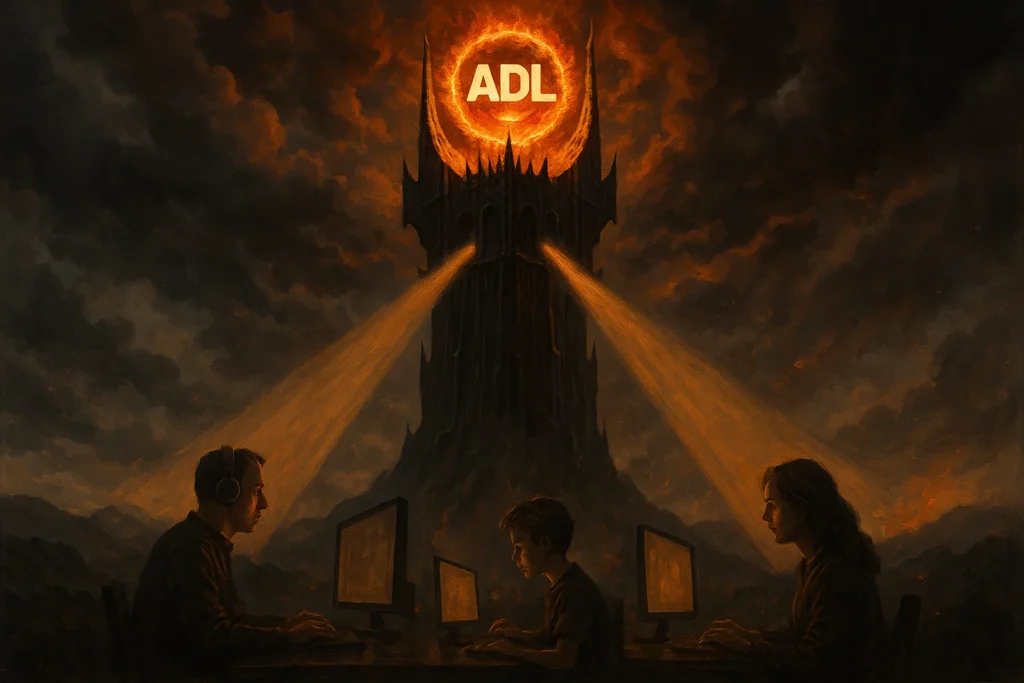
Kowert, Schlegel, and Newhouse have imported the same playbook into gaming. By redefining normal gamer culture as “extremism,” they ensure the panic never ends and the grant money never dries up. The result isn’t public safety — it’s a perpetual motion machine of fear.
The Feedback Loop & Grift Cycle
This industry doesn’t just waste money. It manufactures the very resentment it claims to fight. The formula is simple:
- Inflame Suspicion — Smear an entire community (gamers) as “at risk” of extremism.
- Trigger Resentment — When those gamers object, mock the system, or push back, their anger is inevitable.
- Rebrand the Anger — That resentment is then cited as proof of radicalization. “Look,” the report authors can say, “they’re defensive, they must be hiding something.”
- Cash In — Each loop justifies more grants, more “trust & safety” audits, more NGO dashboards, more contracts.
This is the same scam perfected in the “online harassment” industry: provoke a community with hostile reporting, wait for the backlash, and then present the backlash as evidence of toxicity. The ADL turned this loop into a $500 million endowment. Kowert and Schlegel are running the same playbook in gaming.
The end result is a self-reinforcing system: suspicion creates resentment, resentment is rebranded as extremism, and extremism is monetized. The cycle never ends, because the business model depends on keeping it alive.
Conclusion: A Hate-Hoax Playbook Paid For By You
Gaming and Extremism is not research. It is a taxpayer-financed hit piece that pathologizes memes, in-jokes, and competitive play as precursors to terrorism. Kowert and her colleagues are not neutral investigators but moral entrepreneurs monetizing panic.
When $1.4 trillion has already been shoveled into DHS, the fact that $700k more went to pathologizing gamers is not just wasteful—it’s corrosive. It weaponizes bad science against ordinary citizens and launders it into federal policy.
The proper response is contempt, not compliance. Demand the full dataset. Demand independent replication. Defund the grift. Until then, treat Gaming and Extremism for what it is: a taxpayer-funded smear brochure, authored by activists who profit from the panic they sow.
— Wolfshead
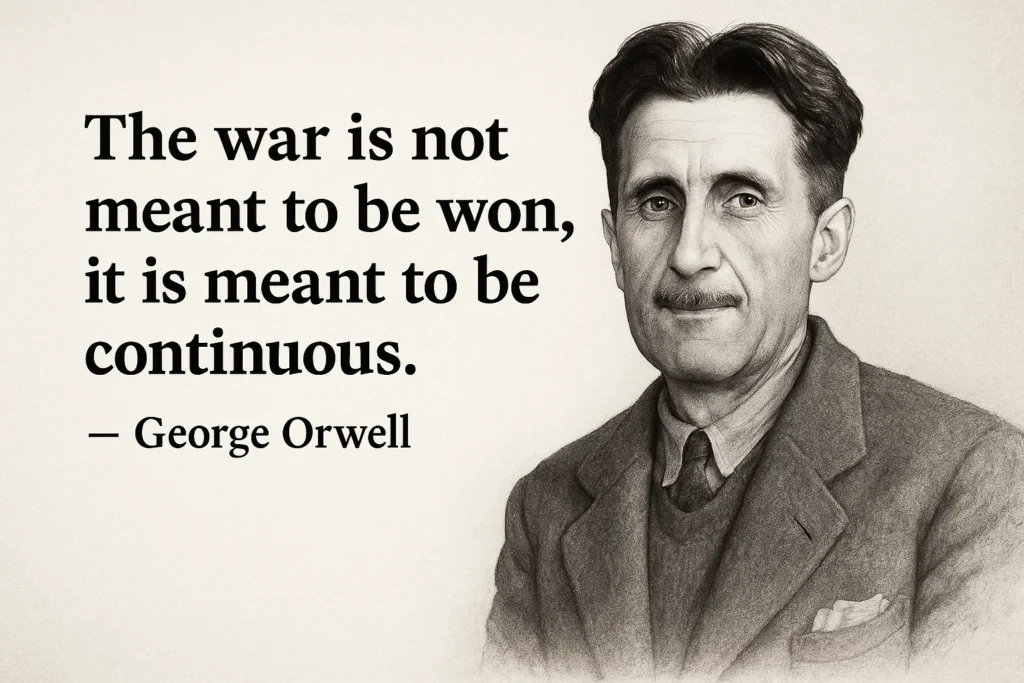

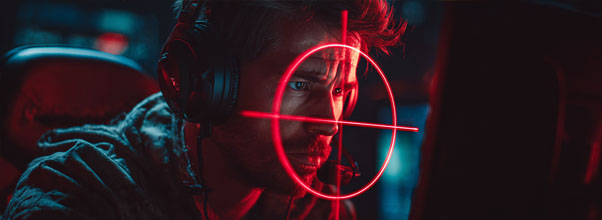



Declaring their own ideology driven drivel “science” and even collecting money for it, socialism in top form.
The problem is that they still have people listening to them. This gives them way too much power over culture and creative arts then I can stomach.
I already face too much of this dangerous activism whether I like it or not, TV. Hollywood, Social Media, Literature and Gaming. A relentless and vile attack on common sense that aims to twist and warp people till they are so confused that I wonder that they can still be functional.
Stopping “hate” is a billion dollar business. There isn’t enough supply of hate to meet the demand, so these professional grifters need to broaden the definition of hate.
However, notice they never address the growing violence of transgenders and ANTIFA. Nothing to see here folks. Thankfully Trump is in power and we should see the funding cut to these parasites.